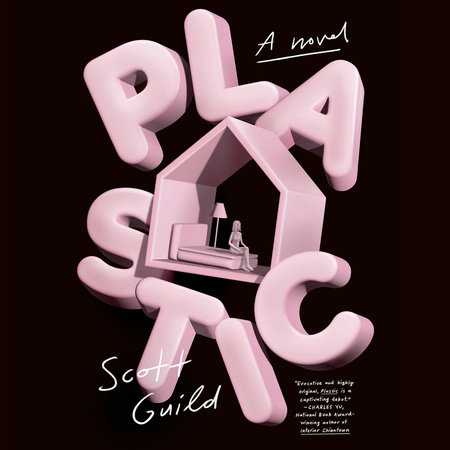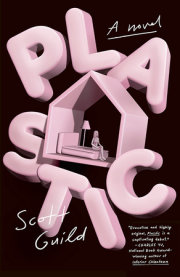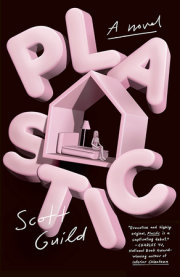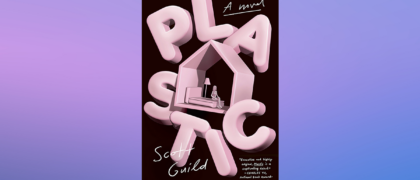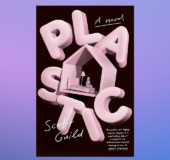1 A DOLL’S HOUSE The episode opens on a plastic woman driving home from work.
The camera follows her from outside the car, filming her through the window, showing her hard, glossy face inside the dim sedan. She is in her twenties, a pale figurine, with sunken eyes and hollow cheeks, nylon hair cut short above her ears. Houses whisper past on the street beside her, the sun setting over their rooftops, their shadows long in the last hour of twilight. Her surface, smooth and specular, reflects the fading light; her fingers, bent at their hinges, grip the upper rim of the wheel. The name tag pinned to her polo shirt reads,
Erin: Ask Me Anything! She rolls to a stop at an empty crosswalk, drums two fingertips idly against the wheel. A single drone is swimming through the smog above her suburb, like a fish seen from the bottom of a frozen lake. Then, as she glides through the intersection, Erin’s voice begins to narrate on the soundtrack. It is a quiet but expressive voice, just louder than the hum of the tires on the pavement.
A year ago, she narrates,
I was a very different person. On a night like this, a Friday, I’d be hurrying home from Tablet Town, dying to hang up my uniform and start the weekend. Patrick was in my life back then, a reason to get through the hours on the sales floor. I thought—no, knew—that nothing could ever take him away from me. The street that scrolls beside her car is dusky and deserted, no vehicles in the driveways, no pedestrians on the sidewalks, no curtains open behind the barred windows. The houses slide past her in a continual sequence, like a succession of blurred photographs, each different in their color scheme but not in their basic construction, shades of pastel siding on the same one-story frame. The backyards are also identical, save for an occasional razor wire fence that glistens above the hedges.
The camera leaves the street, cuts to a close-up of the plastic woman. Shadows drift across her molded face.
Last year, if someone had asked me—that other, naive Erin—I would have told them my life was perfect. And it’s true: I was happy, in my own way. Each night I drove home to Patrick, hid from the world in his arms. I stayed in with him every weekend, barely went out except for groceries. Oh, Patrick. I lost him in the end, of course. Like I’d lost my father, my sister. Like I’ve lost almost everyone else. Erin slows the car and steers onto the pitted slope of a driveway. At the top sits a small blue house, its aluminum siding faded, its gable roof missing a few shingles. She stops at the garage, takes out her phone and taps a garage-shaped icon. The wobbly door rattles upward.
These days I spend my weekends alone, just trying to stay distracted. I sleep in as late as I can. I binge episodes of Nuclear Family.
I clean the entire house, room by room. And on Friday nights, when I miss Patrick the most, I cut myself some slack. I go online and order a Hot Date. I don’t think too much about it. It just helps. Erin stares at the house in the half-light, her plastic eyes glazed with sunset. The camera holds the shot for a few seconds before the scene fades out.
###
The next scene opens on a slender kitchen, a clean but timeworn room. The floor is a scuffed linoleum, the oven range missing two knobs; columns of blue poppies bulge along the lumps in the wallpaper. A modest yard is visible beyond the window bars: a square of grass enclosed in hedges, a lone pine tree looming at its rear. The pine tree casts a slanted shadow, stretched out on the lawn like a stilt walker.
A door opens on the wall of poppies, revealing the figurine as she steps from her garage. The camera follows Erin as she strides across the kitchen, her gait jerky and mechanical, her upper body unbending. She passes into the dining room and down a brief hallway, the wallpaper darker in patches where a row of picture frames once hung. At the end of the hall is a narrow bedroom, its curtains wan with twilight, a bottle of prescription pills open on the bureau. A stuffed seal smiles at her from the shadows of the headboard, its fluffy flippers reaching out in a gesture of embrace.
Erin sits stiffly on the bed, crosses her legs with a murmur of hinges. She slips her phone from her Tablet Town slacks—a neon
T on either knee—and taps in the passcode. Soon she is scrolling through profiles on Hot Date, picture after picture of plastic men, some stubbled and some clean-shaven, some with innocent smiles, others with coy, seductive smirks. Above them glitters the heading:
Pick Ur Boytoy! Before Patrick died, she narrates,
I never dreamed I’d pay for a Hot Date. Why would I? We were settled down, the two of us, starting a family. Even after his murder, I only considered it when these Fridays became so painful. It made me nervous at first, the thought of some stranger coming into my house. But in the end I felt so lonely, I took the chance. She taps the photo of a twenty-year-old Hot Date: a long-haired man with a mellow grin and 4.9 stars, sitting bare-chested in a canoe with a Labrador curled at his feet.
Confirm? the app inquires. She confirms. Then she takes off her Tablet Town sneakers—a
T on either toe—and leans back against the headboard.
TV on, she says to her flatscreen, mounted above the bureau. Open
Nuclear Family. The show begins to play, resumed at the opening notes of a musical number. On the screen a teenage figurine paces through his bedroom, a circle of spotlight following him across the sitcom set. He sings a tender ballad to a photo he holds in his hand, a picture of his secret love: a giant waffle boy with rubber arms and legs. As a pedal harp plucks on the soundtrack, he closes his eyes and touches his lips to the waffle’s enormous mouth.
Erin lifts her stuffed seal off the headboard. Volume up 3X, she says to the TV.
She pets the plush pinniped, staring at the lovelorn boy on-screen.
###
Copyright © 2024 by Scott Guild. All rights reserved. No part of this excerpt may be reproduced or reprinted without permission in writing from the publisher.

